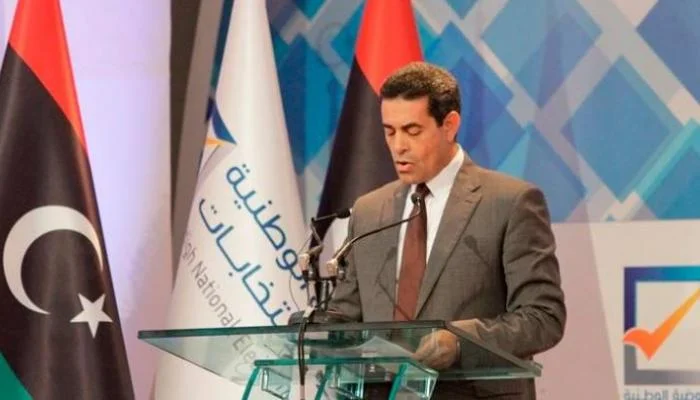Articles
Is Libya Sliding Into The Abyss Again?
- December 16, 2021
- Posted by: mohamed mabrouk
- Category: Middle East Unit Reports

Published by: Radwa Ramadan El-Sherif
Last Saturday, Libya’s High National Elections Commission (HNEC (announced the delay in publishing the final list of the presidential candidates, quoting its plans on judicial and legal procedures related to the electoral process.
“The Commission will adopt some judicial procedures in communication with the Supreme Judicial Council, and legal procedures in communication with the House of Representatives, before publishing the final list of candidates and announcing the commencement of the electoral campaign,” the HNEC said in a statement.
The HNEC was supposed to announce the final list of the presidential candidates after the judicial appeals ended on Tuesday.
On its part, The Libyan commission reviewing the judicial verdicts regarding the presidential candidates’ challenges, promising every effort to ensure that all its decisions are in line with the issued verdicts.
Although many Libyan and foreign officials continued their public calls for the elections to be held as scheduled. However, others expressed their skepticism due to factional rifts in the war-torn country.
Significant delays may increase the risk of derailing the broader peace process in Libya, although disputed elections held without clear agreement on rules or eligible candidates also constitute immediate risks to stability. Will Libya slid into the abyss again?
Challenges and divisions
Criticisms against the interim government
In a statement addressed by 17 members of the Political Dialogue Forum to the Secretary-General of the United Nations, Antonio Guterres, in which they criticized Prime Minister Abdel Hamid Al-Dabaiba for violating the road map which was approved by the forum regarding the government’s duties as a sponsor, impartial and guarantor of the electoral process, as well as exceeding the pledges that guarantee the impartiality of this authority.
Suspicions spread about the Libyan interim government. Despite the interim government’s pledges to commit to unifying institutions and addressing major crises in the country, and its pledge not to run in the upcoming presidential elections, all of this was ignored.
Brotherhood obstructing elections
While the Libyans and the international community are increasingly insisting on holding the elections on December 24, the Islamist Brotherhood is defying the will of the Libyans and the international community to hold the elections on December 24.
The group is trying to obstruct the electoral process, as militias in western Libyan cities have recently besieged and closed a number of election centers and forced their employees to leave them forcibly.
A number of them are also holding a sit-in within the walls of the High Electoral Commission, putting some pressure on it until the announcement of the final list of candidates for the presidential elections.
Seif al-Islam Gaddafi back in Libya’s presidential race
The Court of Appeal in the southern city of Sabhā has accepted appeal by Seif Al-Islam Gaddafi, son of the former Libyan leader Muammar Gaddafi, bringing him back into the race for the presidential election to be hold on December 24. However, he is wanted by the International Criminal Court for alleged crimes against humanity during the revolt held by the Libyan militia for six years, he was released in 2017.
Will the elections be postponed?
A number of candidates for the Libyan presidential elections confirmed in a virtual symposium for candidates for the presidential elections in Libya, which was held yesterday, that they do not mind moving the election date as required due to technical necessities, provided that the date of December 24 is included in the electoral procedures period.
The meeting also affirmed a full commitment to the right of Libyans to express their will to choose their leaders through the ballot boxes, and their willingness to cast their votes to choose the country’s president and members of the next legislative authority.
In conclusion, Libya intends to hold national elections on December 24, to end 10 years of power struggle and the conflict of legitimacy according to the outcomes of the Libyan political dialogue held in Tunisia in November 2020.
However, there are voices calling for postponement and others for the entitlement to take place on the scheduled date, December 24, and between the two sides, the Libyans are waiting for the next step to determine the fate of the country.
All the current indicators are heading towards postponement, by inferring the delay of the High Elections Commission in announcing the final list of presidential candidates, giving the signal for the launch of propaganda campaigns, and announcing political actors, their desire to postpone the electoral date to arrange the papers again.
Postponing the elections will further complicate the scene and the diplomatic path, unlike the loss of confidence in the international community, which is demanding and pushing for the completion of the electoral process, and if it is postponed, it will be a major failure of the international powers towards the Libyan crisis.
This delay puts strong pressure on the date of the elections set for December 24, and does not leave enough time for campaigning period for the candidates accepted in these elections, leaving only the option to delay the elections for weeks or months.
The international parties fear that the postponement of the elections will lead to a derailment of the peace process in Libya, and the return of violence and fighting to the country, especially in light of the failure of the Libyan actors to agree on the rules or qualified candidates.
While the upcoming elections were expected to unite the Libyans and the country and end a decade of chaos, political and regional divisions re-emerged between the three camps in the west and east of Libya, including the current of the resurgent former regime.
